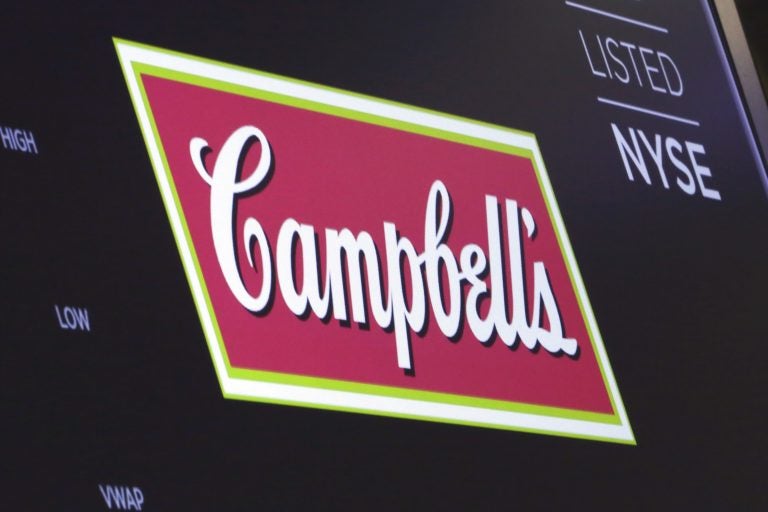Activist investor blasts ‘abysmal leadership’ at Campbell Soup Co., urges sale
This year Campbell’s earnings declined, its stock price dropped, and its CEO retired.
Listen 1:49
The logo for Campbell's Soup appears above a trading post on the floor of the New York Stock Exchange, Friday, May 18, 2018. Campbell Soup plunged 10.9 percent after announcing that its CEO, Denise Morrison, was retiring effectively immediately. (Richard Drew/AP Photo)
A New York City-based investor is calling on top brass at the Campbell Soup Company to put the business up for sale, after what he calls “years of abysmal oversight.”
Dan Loeb, who runs the hedge fund Third Point, said the food giant owes it to shareholders to take the company in a new direction after months of uncertainty at the Camden-based firm.
This year Campbell’s earnings declined, its stock price dropped, and CEO Denise Morrison retired.
Since Morrison’s retirement, Campbell has been conducting a “strategic review” of its entire portfolio. While the company has not commented on rumors of a sale, top Campbell officials said all options are on the table as part of the review.
Still, in a filing with the Securities and Exchange Commission, Loeb suggested that “the only justifiable outcome of the strategic review is for [Campbell] to be sold to a strategic buyer.”
Loeb recently gobbled up 17 million shares in Campbell, taking a 5.6 percent stake in the company. At the same time George Strawbridge, Jr. bought additional stock, bringing his share of the company to 2.8 percent. The two men joined together to urge the company to put itself up for sale.
Strawbridge is a member of the Dorrance family, who are descendants of John T. Dorrance, the man who invented condensed soup and, at one point, ran Campbell.
But other Dorrance descendants — who may not be as eager to put the family business on the chopping block — could prevent a sale.
A third of the company’s stock is owned by two people: Mary Alice D. Malone and Bennett Dorrance, both grandchildren of Dorrance, who sit on Campbell’s board of directors. A family trust owns additional shares.
Two-thirds of shareholders would have to agree in order to sell Campbell.
“The family still owns an extraordinary amount of company stock, which is very rare today,” said Charles Elson, director of the John L. Weinberg Center for Corporate Governance at the University of Delaware.
For Loeb to succeed in his quest to bring about a Campbell’s sale, Elson said, he would have to sway Dorrance family members who have previously opposed selling. “Can you convince them that change is necessary?”
In a statement on its website, Campbell reiterated that it was conducting a review and said it would announce the results at the end of August. “Our entire board of directors remains dedicated to delivering a go-forward strategy that will drive value for all shareholders,” it said.
Rumors swirled in June that Kraft Heinz was interested in buying Campbell; both companies declined to comment.
Some Wall Street analysts agree that Campbell would have to undertake major changes to generate better returns for investors.
“We do think Third Point has a good point,” said Ken Goldman, a managing director with JPMorgan who has been following Campbell since 2004.
Goldman said Campbell continues to struggle despite forays into the more popular food categories of fresh food and snacks. The company bought snack giant Snyder’s-Lance in March.
“The fundamental problems that [Campbell] has are going to be difficult to overcome,” Goldman said. “It’s not like suddenly consumers are going to shift to eating canned soup again.”
WHYY is your source for fact-based, in-depth journalism and information. As a nonprofit organization, we rely on financial support from readers like you. Please give today.


